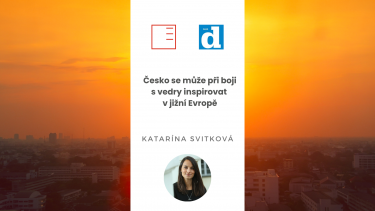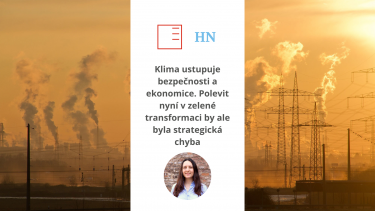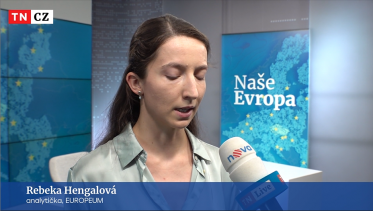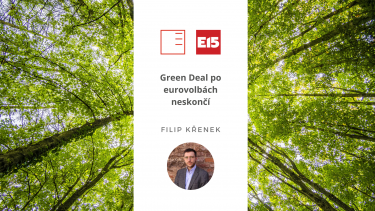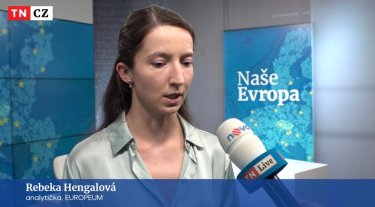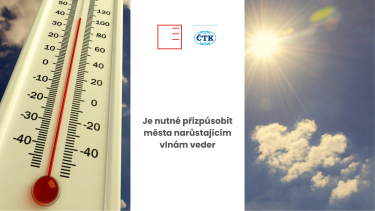Hospodářské noviny | Let's keep our no and think about how to build Wall Street in Europe
Europe has a problem compared to other large economies in the world. It is lagging behind. What to do about it? The new European Commission has changed priorities compared to the previous one - more on the economy, less on the climate. How does this suit the Czech Republic and how should it approach it? Deputy director of EUROPEUM Institute Viktor Daněk commented for podcast Ranní brífink of Hospodářské noviny.
Show moreBalkan Insight | City Heat: What Central European Capitls Are Doing To Keep Cool
With another heatwave expected this week following record temperatures in July, cities in Central Europe are belatedly taking action – but politics keeps getting in the way. Katarina Svitkova, an Associate Research Fellow at EUROPEUM Institute specializing on climate change, urbanism and sustainability, comments for Balkan Insight.
Show more
ČTK | Czech cities are unprepared for heatwaves. They can find inspiration in Barcelona
Czech cities can draw inspiration from southern Europe in combating heat, such as Barcelona, which has effective plans and is better adapted to high temperatures. For instance, the city boasts over two hundred "climate shelters" in publicly accessible spaces like museums, galleries, offices, and libraries, providing drinking water, air conditioning, and informational services. However, the Czech Republic is unprepared for heatwaves. Associate Researcher Fellow at EUROPEUM Institute Katarína Svitková commented for the Czech News Agency.
Show more
Deník.cz | Czech Republic can find inspiration in southern Europe in the fight heatwaves
Czech cities could take inspiration in combating high temperatures from cities in southern Europe, such as Barcelona, which has effective plans and is well-adapted to extreme heat. Barcelona boasts over two hundred climate shelters in publicly accessible institutions like museums, galleries, offices, and libraries, providing drinking water, air conditioning, and informational services. According to Katarína Svitková, an Associate Research Fellow at EUROPEUM Institute, Czechia lacks action plans and responds to heat only at the last minute. Preparedness for tropical days is crucial for protecting the population, especially seniors and young children, for whom summer days are the most demanding.
Show more
WhatNews | Cities are expecting another heat wave this year. What is Prague doing to keep us from getting baked?
The average temperature in the Czech Republic has increased by 2.2 degrees Celsius since the 1960s. As a result of climate change, the country is suffering more frequent weather extremes: torrential rain, drought and heat. Heat waves are particularly severe in heat islands that form in cities. Prague wants to rapidly reduce greenhouse gas emissions, add greenery and water features. Will it be enough? Katarina Svitková, an Associate Research Fellow at EUROPEUM Institute gives examples to WHAT news on how Barcelona is adapting to the heat.
Show more
Hospodářské noviny | Climate is giving way to security and economy. However, easing off on green transformation now would be a strategic mistake
This year's elections to the European Parliament have sparked debates about continuing the European plan to reduce greenhouse gas emissions to net zero by 2050, despite recent events suggesting the need to reassess this plan. The election results did not signify as much of a setback for European green ambitions as anticipated. The priority of climate and environment is no longer as high among most Europeans as it was five years ago, reflecting current political and international challenges such as security, economic prosperity, and the competitiveness of European industry. Kateřina Davidova, a researcher at EUROPEUM Institute, wrote an opinion piece on this topic for Hospodářské noviny.
Show more
TV Nova | How does the Czech public view climate change and the development of renewable energy sources?
Before the upcoming elections to the European Parliament, a debate was held on TV Nova among the leading figures of the seven main political parties, movements, and coalitions. Discussions revolved around important issues such as the migration pact or the conflict in Ukraine. Rebeka Hengalová, a research fellow at EUROPEUM Institute, provided an analysis for TV Nova on how the Czech public views climate change and the development of renewable energy sources.
Show moree15 | Green Deal will not end after the EU elections. It needs to be brought back down to earth and wrapped in more attractive paper
This weekend's European Parliament elections will strongly influence the EU agenda for almost the rest of the decade. In particular, the future fate of Green Deal is of great curiosity. After the frenetic green activity of the last five years, the political winds are turning and the appetite for tackling climate change is waning. Filip Křenek, Project Coordinator and Analyst at EUROPEUM Institute, comments on the situation for e15.
Show more
TV Nova | Development of renewable energy sources
How does the Czech public view climate change and the development of renewable energy sources? Do they see it as a path to competitiveness? According to Czechs, should the European Union focus on environmental issues? Rebeka Hengalová, a research fellow at EUROPEUM Institute, discussed the STEM survey results in collaboration with the EUROPEUM Institute on the program "Naše Evropa" on TV Nova.
Show moreČTK | The necessity to adapt cities to the increasing heatwaves
With the increasing frequency of tropical days due to climate change, it is essential to adapt cities as soon as possible through various adaptation measures, such as planting trees and plants. Experts emphasize the need for projects that reduce temperature and improve the quality of life for city residents, despite the financial challenges of their implementation. ČTK reports on the discussion on climate change organized by EUROPEUM Institute.
Show moreStaroměstské náměstí 4/1
Prague 1 - Staré Město
110 00
tel.: +420 212 246 552
email: europeum@europeum.org
https://www.europeum.org



